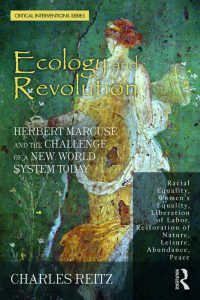
In a global society in which people are increasingly aware of the injustices and environmental carnage that pervades modern existence, thoughts of humanity’s promise relative to its current status can easily give rise to despair. The German philosopher Georg Hegel referred to this form of mental suffering as “unhappy consciousness” — the grim realization that although we can do better as a civilization, we are failing to do so.
This phenomenon functions as an important element in the ideas of Herbert Marcuse, a German American philosopher whose teachings were influential in the “New Left” political movements that emerged in the latter half of the 20th century. Although Marcuse is best known as a critic of capitalism and its attendant destruction, violence and inequality, his theories about the role art should play in a progressive, peaceful society remain timely and informative.
According to Charles Reitz, the author of “Ecology and Revolution: Herbert Marcuse and the Challenge of a New World System Today” (2019), “Marcuse emphasizes that aesthetic goals are among the most radical goals of socialism, beyond its minimum features of meeting human needs justly and fully.”
Reitz, a Kansas City-based social and political philosopher, has written extensively on Herbert Marcuse and radical social theory. He earned his doctorate in educational philosophy at the University of Buffalo in 1983 and served as professor of philosophy and social science at Kansas City Kansas Community College.
For as long as people have been expressing themselves through art, the things we create have served as an intersection for every other human endeavor. Politics, emotions, religion, nature, science, technology and ideas all find a voice in the arts. Ultimately, art is inextricably linked to the “unhappy consciousness” in that it represents either the anguish we feel in the face of our unmet potential or the hope that humanity can harness its powers benevolently toward a brighter future.
“Ecology and Revolution” is an exhaustively researched primer on Marcuse’s conviction that humans must radically transform their relationships with the earth and each other, and although the aesthetic form of socialism is only one aspect of the book, Reitz succeeds admirably in conveying the critical ways in which art can both catalyze and reflect social progress. He notes that “society can and should be a work of art featuring racial equality, women’s equality, the liberation of labor to creative work for the common good, and the restoration of nature, leisure, abundance, and peace.”
The premise of liberation from the shackles of capitalist brutality appears frequently in both Marcuse’s original sources and Reitz’s interpretations of them. Writing in chapter 1 of “Ecology and Revolution,” Reitz explains “Artworks alone . . . cannot fulfill the promise of liberation, yet in Marcuse’s view, the insights provided by study of the humanities are the intellectual precondition to any political transformation of alienated human existence into authentic human existence.”
For contemporary audiences, this is a valuable reminder that the work artists do deserves our time, effort and attention. Art that provokes outrage, inspires new ideas, or asks difficult questions is a precursor for the self-awareness and understanding humans need to close the gap in the “unhappy consciousness” between what is real and what is possible. As Reitz aptly notes, “Art’s critical task is the disclosure of the tragical-beautiful paradox in life, and this is the hallmark of its truth.”
Art need not be pleasant nor easy to process in order to tell us something important, and in fact, some of the most effective art of our times addresses topics like racism, greed, classism, sexism and mass consumption — the same barriers to a just society that Marcuse critiques in his 1977 book, “The Aesthetic Dimension: Toward a Critique of Marxist Aesthetics”:
“If art were to promise that at the end good would triumph over evil, such a promise would be refuted by historical truth. In reality it is evil which triumphs, and there are only islands of good where one can find refuge for a brief time. Authentic works of art are aware of this; they reject the promise made too easily; they refuse the unburdened happy end.”
Ultimately, Reitz believes that the aesthetic form of ecosocialism — a world in which no one’s needs go unmet and all people are free to express themselves passionately and creatively through their art and labor — cannot be realized until human culture is “characterized by partnership power rather than dominator power.”
Until then, art remains a reminder of where we’ve been and where we need to go to finally escape the “unhappy consciousness” of our era.













